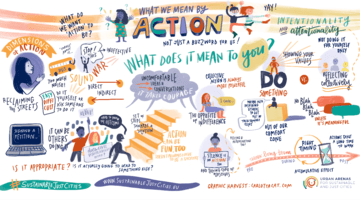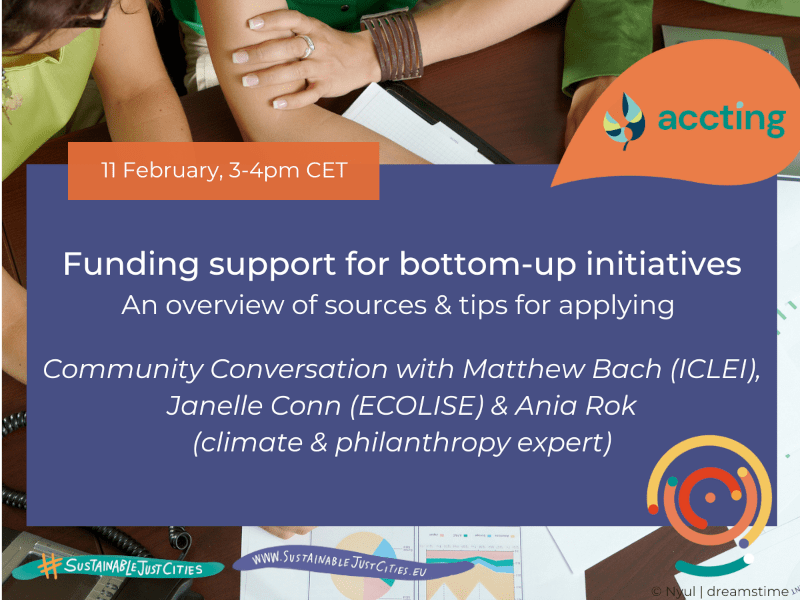
Urban Community for Sustainable Just Cities
Building an UrbanCommunity for sustainable and just cities in Europe through micro-funds and peer-learning

For grassroots initiatives and civil society organisations, securing sustainable funding is often one of the biggest challenges. While these organisations play a critical role in driving local action—whether on climate, social justice, or community resilience—the question of where to find financial support remains a major barrier.
At ICLEI Europe, our Justice, Equity & Democracy Team has been actively working at the intersection of local governance and civil society collaboration. Through projects like ACCTING, Urban Community, and COM4LGD, we’ve explored how community-led action can be better supported in creating sustainable and just cities—both through local government partnerships and long-term funding arrangements. While the European Green Deal and other high-level policies set ambitious goals, their success ultimately depends on the ability of local actors to bring them to life. But how do these actors secure the financial backing to do so?
To tackle this challenge, ICLEI recently hosted a webinar on funding opportunities, providing an overview of key sources available for European civil society organisations. In addition to breaking down major EU programmes, we also shared practical tips on navigating funding applications and heard insights from experts in philanthropic funding. Finally, we explored a concrete funding opportunity: the Regenerative Communities Fund.
EU funding programmes offer some of the largest financial opportunities for civil society organisations, but they often come with significant administrative requirements and complex application processes. Matthew Bach outlined several key funding sources, each with its advantages and challenges:
While EU grants can provide stability (2–5 years of funding), they often require co-funding, strong partnerships, and rigorous reporting. Organisations are encouraged to team up with experienced leads, plan for delayed payments, and consider the bureaucratic workload before applying.
Beyond EU grants, philanthropic funding offers greater flexibility and can be less bureaucratic. Ania Rok, an expert in this field, shared key insights on how to engage funders effectively:
For organisations looking for immediate funding, the Regenerative Communities Fund presents an exciting opportunity. As part of the Funding Fairer Futures programme, this fund—managed by ECOLISE, CAN Europe, and partners—is the first European fund dedicated to regenerative communities.
The first call for proposals will fund five national hubs over 30 months, each receiving €40,000 to support grassroots sustainability initiatives. Eligible applicants must be based in one of 10 pre-selected countries, have 3–5 years of experience in community outreach, and work on climate resilience, ecological restoration, and related topics. Unlike traditional EU funding, this programme is more accessible, with a focus on supporting harder-to-reach groups for long-term impact.
Applications for this fund—and four other funding opportunities under the Funding Fairer Futures programme—are open until March 7, 2025. Organisations can apply for maximumtwo funds but can only receive funding from one. More details, including eligibility criteria and FAQs, can be found on the Regenerative Communities Fund website. If you’re a CSO working on climate and sustainability, consider applying for the fund and keep your eyes peeled for upcoming funding opportunities of the Funding Fairer Futures project!
Funding remains one of the biggest challenges for civil society organisations, but a diverse funding strategy—mixing EU grants, philanthropy, and smaller-scale funds—can provide long-term sustainability. While EU programmes offer stability and scale, philanthropic and private funding can fill gaps, reduce bureaucratic burdens, and enable flexibility.
For organisations working on climate action, social justice, and community-driven sustainability, the current funding landscape presents opportunities. Whether through major EU programmes, philanthropy, or new funds like the Regenerative Communities Fund, securing financial support is possible with the right approach, partnerships, and persistence.
We are using cookies, learn more on our data protection page.